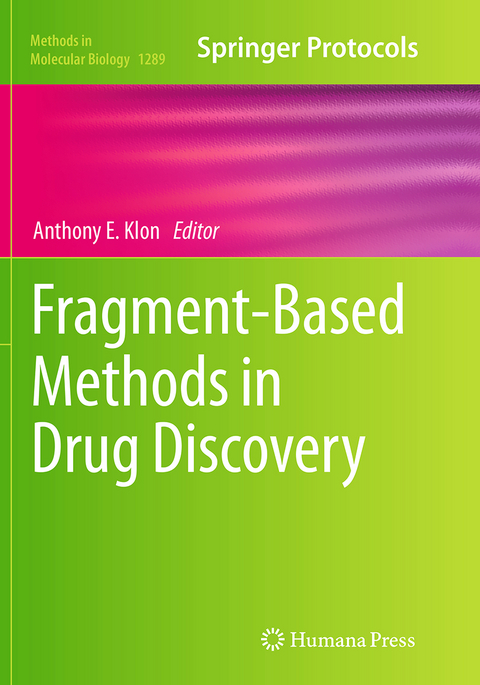
Fragment-Based Methods in Drug Discovery
Humana Press Inc. (Verlag)
978-1-4939-4614-3 (ISBN)
Practical and cutting-edge, Fragment-Based Methods in Drug Discovery takes into account the great accomplishments in the field to provide an ideal guide for researchers continuing to investigate this exciting area of pharmacological study.
Solvation Methods for Protein-Ligand Docking.- Binding Site Druggability Assessment in Fragment-Based Drug Design.- Generating "Fragment-Based Virtual Library" Using Pocket Similarity Search of Ligand-Receptor Complexes.- Virtual Fragment Preparation for Computational Fragment-Based Drug Design.- Fragment Library Design: Using Cheminformatics and Expert Chemists to Fill Gaps in Existing Fragment Libraries.- Protocol for Fragment Hopping.- Site Identification by Ligand Competitive Saturation (SILCS) Simulations for Fragment-Based Drug Design.- A Computational Fragment-Based De Novo Design Protocol Guided by Ligand Efficiency Indices (LEI).- Scoring Functions for Fragment-Based Drug Discovery.- Computational Methods for Fragment-Based Ligand Design: Growing and Linking.- Design Strategies for Computational Fragment-Based Drug Design.- Protein Binding Site Analysis for Drug Discovery Using a Computational Fragment-Based Method.- Fragment-Based Design of Kinase Inhibitors: A Practical Guide.- Designing a Small Molecule Erythropoietin Mimetic.- Designing an Orally Available Non-Toxic p38 Inhibitor with a Fragment-Based Strategy.
| Erscheinungsdatum | 13.10.2016 |
|---|---|
| Reihe/Serie | Methods in Molecular Biology ; 1289 |
| Zusatzinfo | 53 Illustrations, color; 15 Illustrations, black and white; IX, 230 p. 68 illus., 53 illus. in color. |
| Verlagsort | Totowa, NJ |
| Sprache | englisch |
| Maße | 178 x 254 mm |
| Themenwelt | Medizin / Pharmazie ► Medizinische Fachgebiete ► Pharmakologie / Pharmakotherapie |
| Medizin / Pharmazie ► Pharmazie | |
| Schlagworte | Binding site identification • Computational resources • drug design • Fragment binding • Protein model preparation • Simulation • Target proteins |
| ISBN-10 | 1-4939-4614-5 / 1493946145 |
| ISBN-13 | 978-1-4939-4614-3 / 9781493946143 |
| Zustand | Neuware |
| Haben Sie eine Frage zum Produkt? |
aus dem Bereich


